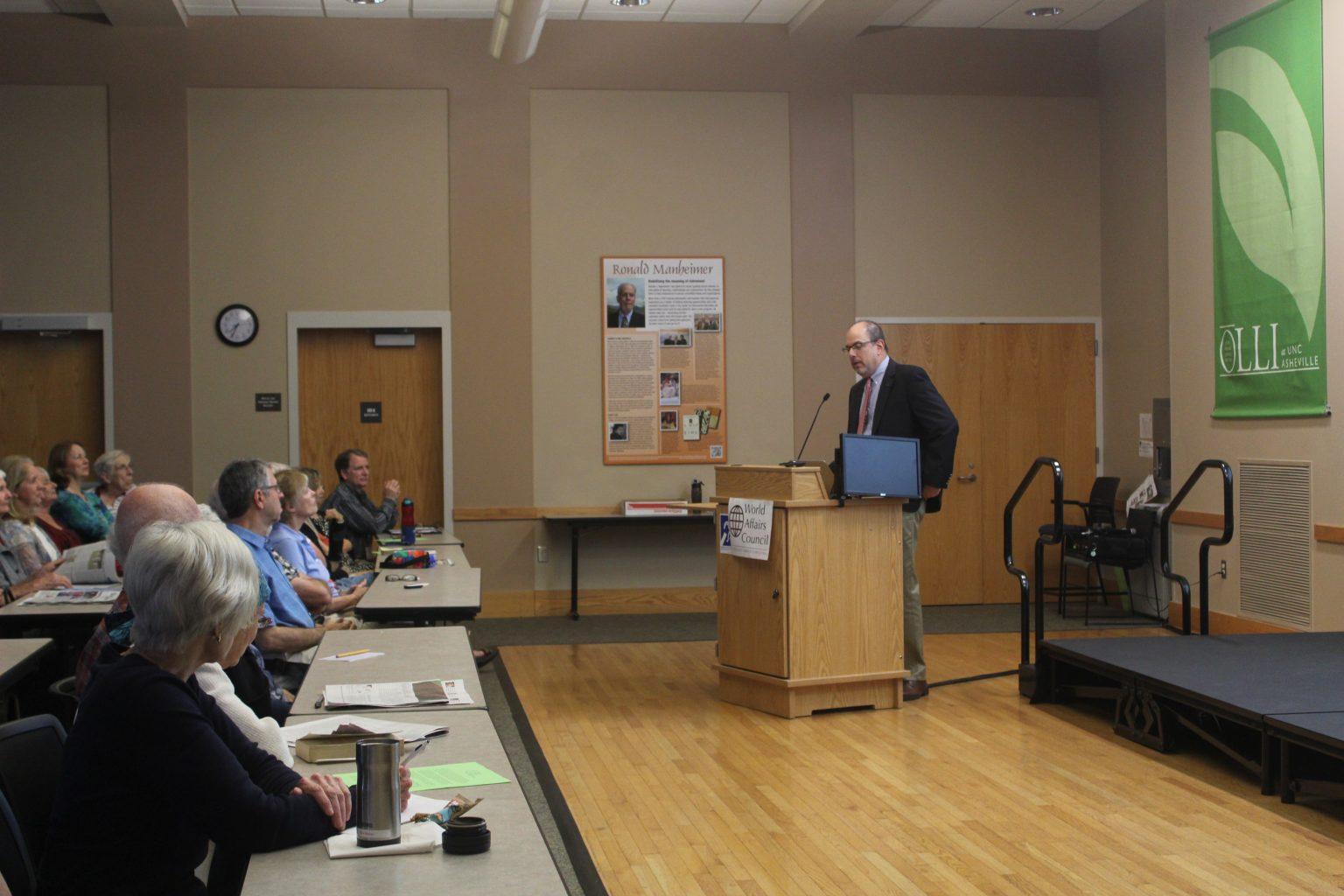
Larisa Karr
News Editor
[email protected]
The international community is keeping a close eye on Russia.
With Parliamentary elections approaching in two weeks, the world’s largest country has been the subject of much discussion, particularly in regards to its potential role in the 2016 American election.
The key figure closely under scrutiny is the notorious President Vladimir Putin, whose legacy of authoritarianism and silencing was the subject of a lecture Tuesday evening by Steven Solnick, president of Warren Wilson College.
“If you’re here expecting a real feel-good night that tends not to be my take on Russia,” Solnick said. “So if you have a hit flask, this would be the time.”
Solnick began the lecture at the World Affairs Council by focusing on how Putin has a tendency to oppress all opposition against him, including journalists, activists and, most recently, the last independent public-opinion polling agency showed waning support for Putin’s United Russia party.
“The Levada organization was declared by the Russian government to be a foreign agent and, therefore, prohibited from any activities related to the election,” Solnick said. “It will probably be shut down.”
There have been numerous spates of terror under Putin’s regime, primarily against neighboring regions and territories.
Solnick touched primarily on the annexation of Crimea in Ukraine in 2014 and why the civil war in the former Soviet country has its neighbors chewing their fingernails.
“I will call it an invasion of Ukraine because that is what happened,” Solnick said. “It was the first annexation of territory since the end of World War II. That, to me, is what’s significant.”
Russia’s increasing military presence in Ukraine may be a result of its hostility to NATO, an intergovernmental military alliance comprised of 28 member states, not including Russia.
NATO began military exercises in Poland, preparing against the increasing amount of tanks appearing along the Russian-Ukrainian border. Putin, angered by this initiative, began to lash out.
“From Putin’s perspective, this was external meddling in internal politics of a neighboring country that used to be integral to the Soviet health,” Solnick said. “This sticks with him as a direct threat.”
The Brexit was one of the best things that could have happened this year for Putin. Solnick, who characterizes him as an opportunist, said that the United Kingdom’s choice to leave the European Union created a situation where the Russian president can seize the weakening rapport the European countries have begun to develop with each other.
“Let me remind you the sanctions against the Russian economy are primarily European sanctions,” Solnick said. “European sanctions require Europeans to work together.”
George Peery, president of the Asheville World Affairs Council, was elated at the perspective that Solnick helped to shed on the current Russian president.
“I think that Dr. Solnick was so perfect in terms of bringing together kind of this popular, ill-informed image, almost a cartoon image of who Putin is,” Peery said. “A Putin that we understand as a human being and as a politician who could do some very dangerous things, he gave us reasons to understand that.”
Solnick went on to cite an example of Russia’s 1999 invasion in Chechnya, the same year that Acting President Putin rose to power. Four apartment blocks were bombed and hundreds of people killed in response to a separatist movement brewing in the Republic of Chechnya.
“I knew that sometimes Russia has a history of being corrupt, but I think it was interesting to learn really what’s happened and the history behind it,” said 20-year-old Casey Berardi, a political science student at Warren Wilson College. “The things that they’ve done, like the apartment bombing, I had no idea about that.”
Putin’s potential involvement in the 2016 election was another strong focus of Solnick’s lecture, particularly the parallels between him and an infamous front-runner.
A few weeks ago, Donald Trump gave a nebulous answer to a reporter when asked about his response to helping out fellow NATO allies, alluding to the Baltic states of Estonia, Latvia and Lithuania.
“We have many NATO members that aren’t paying their bills,” Trump said. “They have an obligation to make payments.”
He then continued to be vague, implying he may or may not allow Russia to attack the three countries, which are members of the organization, if they do not make their payments.
Particularly noteworthy is the amount of financial investments that Trump has in Russia. He has been quoted as saying the nation makes up a disproportionate cross-section of the Republican front-runner’s assets.
Solnik said both candidates are using each other to their own advantage, with one of the events they are both benefiting from being the Brexit.
“Putin is not a grand strategist. Putin is a counter-puncher. He sees opportunities and he takes them,” said Solnick. “So we see this with Europe and I think that’s what we see right now with Donald Trump.
The likelihood of Putin playing a tremendously pivotal role in the 2016 election, however, is debatable. But, it has never been as much a reality in any other election year as it is now.
“I do not think that the Russians are likely to try to influence the actual outcome of the American election,” Solnick said. “But, Putin is an opportunist and this is a once-in-a-lifetime, once-in-a-generation chance.”


![Brooke Pedersen [second from the right] and Luis Reyes [right] hold banners during the Wrap The Woods event.](https://thebluebanner.net/wp-content/uploads/2025/09/ELIZABETH_PRITCHITT_IMG_3470-1200x804.jpg)
















